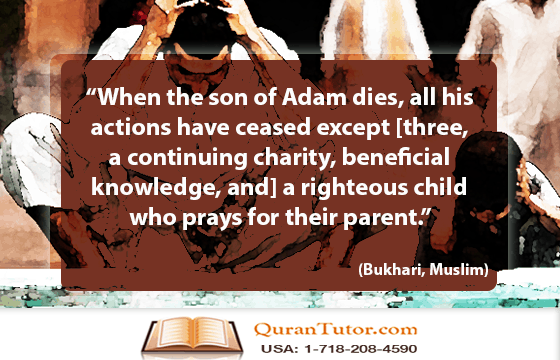Muslim Parents – Elements to Consider When Raising Muslim Kids
Of all the relations that a person can have in this world, perhaps the most sacred and the most crucial of all is the relationship between parents and children. Both of these are equally important to each other and have a significant role to play in making the society civilized and the world a better place for living.
Although in other beliefs present in the world, the parent-children relationship is given importance, however, the kind of emphasis Islam puts on them is of no match and for Muslims developing this relationship within the guidelines of Islam is the primary objective of the familial duties.
The importance of the status, which parents have in Islam, is evident at numerous places in Quran and in the hadith of Prophet Muhammad (PBUH). Allah Almighty says in Quran:
“And your Lord has decreed that you not worship except Him, and to parents, good treatment. Whether one or both of them reach old age [while] with you, say not to them [so much as], “uff,” and do not repel them but speak to them a noble word.”. (17:23)
From this ayah of Quran, the importance and the stature of parents is evident. However, the Islam does not put all the responsibility on the children only, rather the parents are equally responsible for the children’s upbringing, and they have a great responsibility in this regard.
The lines below discuss the different major elements that the Muslim parents must keep in mind pertaining to their relationship with the children and how to train them, as they grow old.
Understand The Responsibility:
Before anything, a Muslim parent needs to understand the kind of responsibility they have pertaining to upbringing of the kids. Parents in no way are allowed to be oblivious pertaining to upbringing of children or should take the upbringing non-seriously, rather it is imperative that the parents do the due diligence to ensure that the children are raised in the best manner closest to Islam.
Prophet Muhammad (PBUH) said in a hadith:
“Each of you is a shepherd, and all of you are responsible for your flocks.” (Sahih Bukhari 6719, Sahih Muslim 1829)
From the hadith of Prophet (PBUH) it becomes clear that parents being the head of the family are responsible for their children, therefore, it is the duty of the parents to take care of the children and fulfill their responsibility in the best manner.
When one speaks of responsibility, it always comes with accountability, hence, for a Muslim parent it is important to understand that they are going to be accountable for the upbringing of their child, therefore, they should try raising the children on Islamic grounds so that the child grows to be a better Muslim – one that is closer to Allah Almighty and blessed.
Allah Almighty says in Quran:
“O you who have believed, protect yourselves and your families from a Fire whose fuel is people and stones, over which are [appointed] angels, harsh and severe; they do not disobey Allah in what He commands them but do what they are commanded..” (66:6)
From this ayah of Quran it is evident that all those who are in a state of authority are responsible for the dependents. Therefore, a Muslim parent is also responsible for the children, moreover, this responsibility is not just limited to this world, rather the parents have to protect the children in the hereafter as well from the fire of hell. This protection can only be done when parents raise their children in such a way that they become better Muslims and live their lives according to the instructions of Allah Almighty in the form of the rules laid down by Islam.
Pertaining to upbringing of children according to Islam, Muslim parents must adopt an approach that entails the following elements:
Quran Teaching And Prayers - In order to be successful in the life hereafter, it is imperative that the children learn to read Quran so that they are able to understand the teachings of Quran and live their life in accordance with them. In order to be successful in the life hereafter, it is imperative that the parents pay heed and arrange a Quran tutor for the kids so that they are able to understand the teachings of Quran and live their life in accordance with them.
Moreover, besides learning Quran, which carries all sorts of knowledge, a Muslim parent must also ensure that the children say their prayers regularly. For a Muslim it is mandatory to say obligatory prayers five times a day, which can only be done if parents start ensuring that the child gets into the habit of prayers at an early age. Therefore, the first and foremost important thing parents must do in order to make their children better Muslims is to teach them Quran and get them into the habit of saying regular prayers.
Teach Daily Life Duas - The other thing the parents can do to make sure that the children are more close to Islam is teach them the daily life Duas. In everyday life, people undertake different chores and duties. Islam gives all kinds of duas and supplications so that people could invoke Allah Almighty and receive His blessings in response. Hence, a Muslim parent must teach children all the duas like the duas for going to sleep, eating meals, leaving home, entering mosque, reciting Ayat ul Kursi before going to sleep and so on, so that the children could become practicing Muslims. Pertaining to the teaching of duas, the following hadith of Prophet Muhammad (PBUH) stands as an excellent example:
“When the son of Adam dies, all his actions have ceased except [three, a continuing charity, beneficial knowledge, and] a righteous child who prays for their parent.” (Bukhari, Muslim)
Worldly Knowledge- Islam does not assert that all a person should do is say prayers and indulge him or herself in worship and forget about the world, rather Islam is a religion of moderation and encourages its followers to live the worldly life in the best manner. In this regard, Muslim parents must ensure tha the children receive worldly education as well so that they are able to earn their livelihood and not live a life of ignorance and poverty.
Treating Them with Compassion:
There is a notion among old school parents that being strict is the way to go when it comes to making the children better Muslims or better at anything. Times have changed and now children retaliate against aggression and strictness, thus the only option Muslim parents have pertaining to making their children better Muslims and enjoying a healthy relationship with them is by being compassionate with them.
When it comes to treating children with compassion, a Muslim can find no other better example than the life of Prophet Muhammad (PBUH). In one of His hadiths, He said:
“He is not one of us who does not show compassion to our little ones and recognize the rights of our elders.” ( Reported as Sahih, Tirmidhi 3/244)
From this hadith of Prophet (PBUH), the message is clear that a parent must be compassionate to the children. This helps develop a strong relationship that is based on love and not fear. This compassionate attitude towards the children is also the Sunnah of Prophet Muhammad (PBUH) about which Anas (RA) reported in the following way:
“I never saw anyone who was more compassionate towards children than the Messenger of Allah. His son Ibrahim (RA) was in the care of a wet nurse in the hills around Madinah. He would go there, and we would go with him, and he would enter the house, pick up his son and kiss him, then come back.” (Sahih Muslim, 15/75)
Therefore, Muslim parent must keep the strictness aside and try developing a relationship with compassion, so that the children get inspiration from them and listen to what they have to say in an attentive and respectful manner.
Spending On Children:
Another thing that a Muslim parent needs to do in order to develop a healthy relationship with the children in the light of Islam is spend on the children. Spending on the family members is natural and every person wishes to do so, however, because of the ignorant cultural values and misery there are people who don’t spend on family members and save money, children defy such parents and are never grateful to them. Prophet Muhammad (PBUH) said in one of His hadiths:
“When a man spends on his family with the intention of pleasing Allah, then it will be counted Sadaqah (charity) on his part.” (Bukhari and Muslim)
This hadith makes it clear that a Muslim parent must spend on the children and make sure that all the necessities of life are available to them, moreover, this should be done out of the intentions of pleasing Allah Almighty. However, the common practice among Muslims regarding charity is that they keep their families on the second level and spend the charity by giving it to poor and other needy people. Pertaining to this the following hadith of Prophet (PBUH) shows light to such people:
“Money you spend for the sake of Allah, money you spend to free a slave, money you give in charity to the poor, and money you spend on your family… The greatest in reward of all of these is the spending on your family.” (Bukhari and Muslim)
Therefore, a Muslim parent must not deprive the children from the necessities of life, whether it is out of miserliness or out of spending on the poor and being charitable.
Conclusion:
In short, as is there are obligations of children towards their parents so are the obligations of parents towards their children. A Muslim parent must take the responsibility of the children, provide them with necessities of life, give them Islamic and worldly education and always deal with them in a compassionate manner so that the relation stays healthy and they grow out to be better and practicing Muslims.
May Allah Almighty help us all in raising our children according to the instructions of Islam and enjoy a healthy relationship with them. Ameen!












